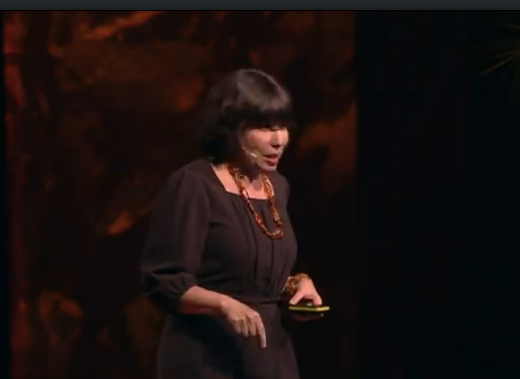What is going on in this baby's mind? If you'd asked people this 30 years ago,
这位宝宝在想什么?如果你在30年前问这个问题,
most people, including psychologists, would have said that this baby was irrational, illogical, egocentric --
大多数人,包括心理学家,会告诉你这个小孩没有理性的,没逻辑,以自我为中心——
that he couldn't take the perspective of another person or understand cause and effect.
他不会站在他人的角度思考,或者不明白因果关系。
In the last 20 years, developmental science has completely overturned that picture.
在过去的20年里,发育学彻底地颠覆了这个观念。
So in some ways, we think that this baby's thinking is like the thinking of the most brilliant scientists.
从某些角度来看,这个宝宝的思维和大多数聪明的科学家的思维相同。
Let me give you just one example of this. One thing that this baby could be thinking about,
我可以举个这样的例子。这位宝宝可能在思考某件事,
that could be going on in his mind, is trying to figure out what's going on in the mind of that other baby.
在他的脑袋瓜中,他想要弄清楚其他婴儿在想些什么。
After all, one of the things that's hardest for all of us to do is to figure out what other people are thinking and feeling.
毕竟,我们最难办到的一件事是理解他人的想法和感觉。
And maybe the hardest thing of all is to figure out that what other people think and feel isn't actually exactly like what we think and feel.
而最难办到的事是理解他人的想法和感觉和我们自己的不完全一致。
Anyone who's followed politics can testify to how hard that is for some people to get.
任何追寻过政治的都可以证明了解他人的想法是多么困难。
We wanted to know if babies and young children could understand this really profound thing about other people.
我们想要知道宝宝和小孩子能否理解其他人的奥秘。
Now the question is: How could we ask them? Babies, after all, can't talk,
目前的问题是: 我们如何与宝宝们沟通呢?他们还不会说话,
and if you ask a three year-old to tell you what he thinks, what you'll get is a beautiful stream of consciousness monologue about ponies and birthdays and things like that.
当你问一个三岁的小孩,他在想什么时,他的回答将会是一串精彩的意识流独白,关于小型木马,生日,或是类似的答案。

So how do we actually ask them the question?
那我们应该如何向他们提问呢?
Well it turns out that the secret was broccoli. What we did -- Betty Rapacholi, who was one of my students, and I -- was actually to give the babies two bowls of food:
秘密居然是花椰菜。我们用的方法是——我的一个学生,贝蒂拉帕求利和我给了这些宝宝们两碗食物:
one bowl of raw broccoli and one bowl of delicious goldfish crackers.
一碗生的花椰菜,一碗是好吃的金鱼饼干。
Now all of the babies, even in Berkley, like the crackers and don't like the raw broccoli.
所有的宝宝,包括在柏克莱的那些,选择了饼干而不是生的花椰菜。
But then what Betty did was to take a little taste of food from each bowl.
但是贝蒂随后品尝了这两种食物。
And she would act as if she liked it or she didn't. So half the time, she acted as if she liked the crackers and didn't like the broccoli -- just like a baby and any other sane person.
然后作出了喜欢或不喜欢的表情。有一半的情况,她的反应和宝宝还有正常人一样——喜欢饼干而不喜欢花椰菜的表情。
But half the time, what she would do is take a little bit of the broccoli and go, "Mmmmm, broccoli. I tasted the broccoli. Mmmmm."
但另一半情况,她是吃一点花椰菜 然后说:"Mmmmm,花椰菜。我吃了花椰菜。"
And then she would take a little bit of the crackers, and she'd go, "Eww, yuck, crackers. I tasted the crackers. Eww, yuck."
然后当她吃到饼干的时候,她说:"饼干真难吃。我居然吃了饼干。真恶心。"
So she'd act as if what she wanted was just the opposite of what the babies wanted.
所以她假装自己喜欢吃的和宝宝们喜欢的恰恰相反。
We did this with 15 and 18 month-old babies. And then she would simply put her hand out and say, "Can you give me some?"
我们对15个月和18个月大的宝宝们做了这个实验。贝蒂将自己的手伸出说 “能给我点吗?"












